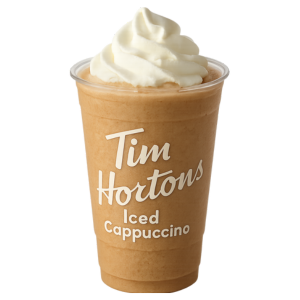
Tim Hortons Iced Cappuccino
Caffeine
140 mg
| Attribute | Value |
|---|---|
| Caffeine Level | Moderate |
| Serving Size | 16 fl oz |
| Serving Size (ml) | 473 ml |
| Sugar | 46 g |
| Calories | 430 kcal |
| Caffeine per fl oz | 8.75 mg/fl oz |
The Tim Hortons Iced Cappuccino — often called the “Iced Capp” — is one of the chain’s most iconic cold beverages. First introduced in Canada in the late 1990s, it quickly became a summer staple thanks to its creamy texture, sweet flavor, and refreshing chill.
Unlike a standard iced coffee, which is brewed coffee poured over ice, the Iced Capp is made by blending coffee, cream or milk, and ice into a smooth, frozen drink. This gives it a milkshake‑like consistency and a richer taste profile.
Flavor Options for Tim Hortons Iced Cappuccino
The classic Iced Capp is coffee‑flavored, but Tim Hortons regularly offers variations such as Mocha, Vanilla, and Caramel. In some markets, you’ll also find seasonal flavors like Pumpkin Spice in autumn or Maple in spring.
Customers can personalize their Iced Capp with flavored syrups, whipped cream, or chocolate drizzle. Dairy alternatives like almond or oat milk are available in some locations, though the texture may differ from the original cream‑based version.
Caffeine Content in Tim Hortons Iced Cappuccino by Size
The caffeine content in an Iced Capp depends on size:
- Small (10 fl oz / ~300 ml) – about 90 mg caffeine
- Medium (14 fl oz / ~414 ml) – about 110 mg caffeine
- Large (20 fl oz / ~591 ml) – about 130 mg caffeine
These amounts are moderate compared to brewed coffee but higher than many soft drinks.
Comparing Caffeine to Other Tim Hortons Beverages
A medium Iced Capp has less caffeine than a medium brewed coffee (which can exceed 200 mg) but more than a medium hot chocolate (which has under 10 mg). It’s a middle‑ground option for those who want a caffeine boost without the intensity of a strong coffee.
Ingredients That Influence Caffeine Levels
The caffeine in an Iced Capp comes from a concentrated coffee mix, which is blended with ice and cream. The concentration of this coffee base determines the final caffeine level.
Adding an espresso shot will significantly increase caffeine content, while choosing a “light” version or a smaller size will reduce it. Dairy alternatives do not affect caffeine levels but can change the drink’s flavor and texture.
Nutritional Profile at a Glance
A small Iced Capp contains about 310 calories, 16 g fat, and 36 g sugar 1. A medium has around 430 calories, and a large can reach 500 calories. The sugar content is relatively high, making it more of a treat than an everyday beverage for those watching sugar intake.
While the Iced Capp isn’t a significant source of vitamins or minerals, it does provide small amounts of calcium from the dairy content. However, its main nutritional contribution is energy from carbohydrates and fat.
